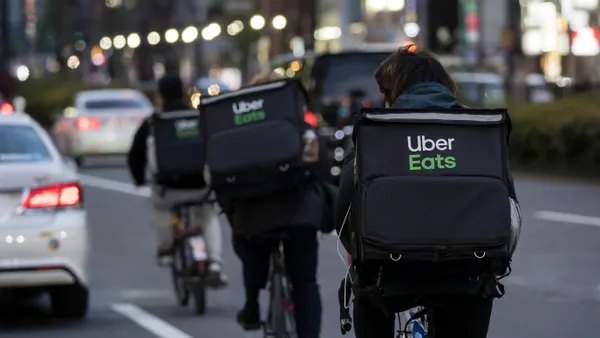Dive Brief:
- Uber laid off about 15% of Postmates' workforce, or about 185 employees, on Thursday, The New York Times reports, citing three people with knowledge of the layoffs. Postmates founder and CEO Bastian Lehmann and most of the executive team are expected to leave the company.
- Additional exits could be coming in future months, with other staff members potentially being asked to leave or serve out the end of their contracts, the publication reports. Some Postmates executives will depart with multimillion-dollar exit packages, and some staff members will receive reduced exit packages, according to the publication.
- These actions are part of the integration of Uber Eats with Postmates, following Uber's $2.65 billion acquisition of the Los Angeles-based aggregator, and layoffs are not uncommon after completed transactions. Following Waitr's acquisition of Bite Squad, the company let go about two dozen office employees in 2019 due to overlapping areas.
Dive Insight:
Even though the Postmates and Uber Eats apps will function separately, Postmates' technology infrastructure will be combined with Uber Eats and supported by existing Uber Eats employees, The New York Times reports. This could leave the door open for the eventual phase out of Postmates' app, if Uber chooses to go that route. Uber Eats still has an impetus to keep the Postmates branding considering Postmates has a strong following in some large markets like Los Angeles, where it has 36% market share, according to Second Measure.
Uber has been betting on its delivery service, which grew significantly during 2020 while its ride-sharing segment declined due to the pandemic. During Q3 2020, the company's gross bookings for delivery grew 135% year-over-year and CEO Dara Khosrowshahi said he expected the company's delivery EBITDA to be profitable sometime this year.
Reducing redundancies, especially with highly paid executives, will also help increase the potential profitability of Postmates, which is expected to add between $350 million and $400 million to Uber’s delivery gross bookings.
Maintaining profitability will be key as Uber pushes for more market share — it has 29% of the market with Uber Eats and Postmates — now that DoorDash dominates the segment with 52% of monthly sales per Second Measure. DoorDash is becoming a more formidable competitor as a public entity and has plans to use its public status to help it expand its platform and grow into new markets. Uber Eats will need to do what it can to make sure that it can accelerate its pace against DoorDash, especially now that it is headed toward profitability.










